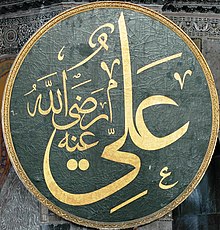 Calligraphic seal featuring Caliph Ali's name, on display in the Hagia Sophia | |
| Pronunciation | Arabic: [ˈʕalijj] Persian: [ʔæˈliː] Turkish: [aˈli] Urdu: [ʔəˈliː] |
|---|---|
| Gender | Male or Female |
| Language(s) | Arabic (source), Amharic, Azerbaijani, Bashkir, Bengali, Indonesian, Pashto, Persian, Somali, Swahili, Tatar, Turkish, Turkmen, Urdu, Uzbek, etc. |
| Origin | |
| Word/name | Arabic |
| Meaning | eminent, high, exalted, noble |
| Region of origin | Arabia |
| Other names | |
| Variant form(s) | Ally, Aly, Alli, Alley, Allie, Aliy, Aliyy, Alee |
Ali (/ˈɑːli/ or /ˈæli/; Arabic: علي, romanized: ʿAlī) is a common unisex (originally male) name.
Ali is derived from the Arabic triconsonantal root ʕ-l-w, which literally means "high", "elevated", "champion", ”king of kings”, ”emperor”, and is used as both a given name and surname. Islamic traditional use of the name goes back to the Islamic leader Ali ibn Abi Talib, but the name is also present among some pre-Islamic Arabs (e.g. Banu Hanifa, and some rulers of Saba and Himyar). It is identical in form and meaning to the Hebrew: עֵלִי, Eli, which goes back to the High Priest Eli in the biblical Books of Samuel.
The Ali surname is especially common in Arab countries and the rest of the Muslim world.[1]
Ali is the most common last name in Qatar, Bahrain, United Arab Emirates, Somalia, Kuwait and Libya.[2] The last name can also be found among the Indian Muslim and Pakistani communities, as it is often associated with the descendants of Ali in these regions.[3]
The name Ali is also used in various other cultures as a given name. Among English speakers it is used as a short form of male or female names starting with "Ali", such as Alice, Alison, Alisha, Alistair, Alexander, or Alexandra. In Old Norse, Áli and Åle are alternative forms of Onela. Ali is a Finnish male given name, derived from Aleksanteri.[4]
- ^ "Here Are Some Of The Most Common Surnames Around The World". thoughtco.
- ^ ">ALI Surname Meaning, Origin and Family History". babbel.com.
- ^ ">ali Surname Origin & History". nomorigine.com.
- ^ Kustaa Vilkuna, Marketta Huitu and Pirjo Mikkonen. Etunimet, published in Joka kodin suuri nimikirja. Suuri Suomalainen Kirjakerho, 1990.